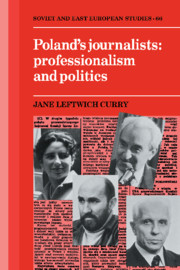Book contents
- Frontmatter
- Contents
- Acknowledgments
- 1 Journalists as professionals in theory and reality
- 2 The postwar roots of the profession
- 3 Living and learning journalism
- 4 Professional associations and professional politics
- 5 Journalists as political actors
- 6 Solidarity and beyond: the critical test of professionals and professionality
- Appendix: Research methodology: unwritten answers
- Notes
- Select bibliography
- Index
- Soviet and East European Studies
4 - Professional associations and professional politics
Published online by Cambridge University Press: 30 September 2009
- Frontmatter
- Contents
- Acknowledgments
- 1 Journalists as professionals in theory and reality
- 2 The postwar roots of the profession
- 3 Living and learning journalism
- 4 Professional associations and professional politics
- 5 Journalists as political actors
- 6 Solidarity and beyond: the critical test of professionals and professionality
- Appendix: Research methodology: unwritten answers
- Notes
- Select bibliography
- Index
- Soviet and East European Studies
Summary
The professional life and world of Polish journalists does not end as they leave their offices and finish their day's work. Nor are their editors and the leading journalists on their staff their only protectors, mentors, and role models. Like Western professionals, Polish journalists' lives are embedded in a web of informal and formal organizations, gatherings, and information exchanges. Their relations with the world outside their profession are brokered not only through their editors and their personal connections but also through their informal and formal professional organization and the example and power of their own professional elite. Finally, their professional training and work experience as well as the demands and the realities imposed on them by their readers and the political elite are not their only basis for the development of group history, myths, and heroes. The professional community and the profession's formal association serves as a forum for the creation and maintenance of this history and these group myths and heroes – even when there is clear political pressure against them.
Ironically, many working journalists in the sixties and seventies publicly scoffed at the idea of the association being any more than a building, clubs of journalists working on the same topics, and services ranging from medical care to a good restaurant with subsidized meals. But, when the Solidarity movement forced journalists to take stock and clean house, it was their organization, the Association of Polish Journalists (the SDP), that they turned to immediately.
- Type
- Chapter
- Information
- Poland's JournalistsProfessionalism and Politics, pp. 117 - 160Publisher: Cambridge University PressPrint publication year: 1990

